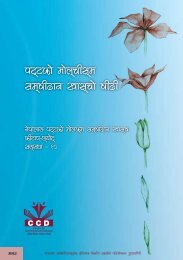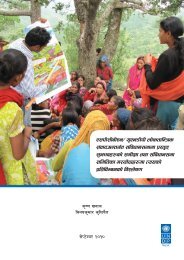English - Support to Participatory Constitution Building in Nepal ...
English - Support to Participatory Constitution Building in Nepal ...
English - Support to Participatory Constitution Building in Nepal ...
You also want an ePaper? Increase the reach of your titles
YUMPU automatically turns print PDFs into web optimized ePapers that Google loves.
adm<strong>in</strong>istrative area <strong>to</strong> avoid dual<br />
rule <strong>in</strong> one particular area.<br />
5. Need for a clear provision<br />
concern<strong>in</strong>g what extra rights<br />
an Au<strong>to</strong>nomous or Special or<br />
Protected Area enjoys over other<br />
local government units.<br />
III. New Dimension of <strong>Nepal</strong>i<br />
Nationalism: Rights of<br />
M<strong>in</strong>orities<br />
III. 1.<br />
In a country like <strong>Nepal</strong>, with<br />
caste/ethnic, l<strong>in</strong>guistic and regional<br />
diversity, federalism serves nation<br />
build<strong>in</strong>g <strong>in</strong> the follow<strong>in</strong>g ways:<br />
III. 2.<br />
• Recognition of identity<br />
• Prov<strong>in</strong>cial au<strong>to</strong>nomy<br />
• Political management of diversity<br />
• Rights of m<strong>in</strong>orities<br />
• Learn<strong>in</strong>g <strong>to</strong> live <strong>to</strong>gether<br />
The CA <strong>Constitution</strong>al Committee def<strong>in</strong>es<br />
the <strong>Nepal</strong>i nation as a multiethnic,<br />
multil<strong>in</strong>gual, multicultural society<br />
<strong>in</strong> which people are bound <strong>to</strong>gether<br />
with common aspirations and respect<br />
for the national <strong>in</strong>terest, <strong>in</strong>dependence<br />
and <strong>in</strong>tegrity. <strong>Nepal</strong> is an <strong>in</strong>dependent<br />
sovereign state characterized<br />
as a republic, secular, <strong>in</strong>clusive,<br />
multi-ethnic and oriented <strong>to</strong>wards<br />
socialism.<br />
Aspirations of the <strong>in</strong>digenous<br />
nationalities and other social groups<br />
from a federal structure:<br />
• Identity and au<strong>to</strong>nomy based on<br />
caste/ethnicity, language, culture<br />
and region.<br />
• <strong>Constitution</strong>al provision for social<br />
justice and positive discrim<strong>in</strong>ation<br />
<strong>to</strong> end all k<strong>in</strong>ds of discrim<strong>in</strong>ation<br />
III. 3.<br />
aga<strong>in</strong>st ethnic groups, women,<br />
Dalits, Madheshis and other<br />
marg<strong>in</strong>alized groups.<br />
• Reservation for excluded groups<br />
<strong>in</strong> proportion <strong>to</strong> the size of their<br />
own populations.<br />
• Inclusive and proportional<br />
representation of all caste/ethnic<br />
groups.<br />
• Right <strong>to</strong> self determ<strong>in</strong>ation as a<br />
fundamental right.<br />
• Political prime rights.<br />
• Prime rights for <strong>in</strong>digenous<br />
nationalities over land, water and<br />
forests.<br />
• <strong>Constitution</strong>al provision ensur<strong>in</strong>g<br />
rights as provided by ILO 169, UN<br />
Declaration and <strong>in</strong>ternational law.<br />
• Mother <strong>to</strong>ngue as medium of<br />
education and also for right <strong>to</strong><br />
<strong>in</strong>formation.<br />
m<strong>in</strong>ority groups<br />
Provisions on the rights of<br />
The CA refers <strong>to</strong> m<strong>in</strong>orities as those groups<br />
that have been discrim<strong>in</strong>ated aga<strong>in</strong>st and<br />
marg<strong>in</strong>alized by the state. It also <strong>in</strong>cludes<br />
those deprived and marg<strong>in</strong>alized groups<br />
that are numerically lower <strong>in</strong> terms of<br />
caste/ethnicity, language and religion.<br />
• Positive discrim<strong>in</strong>ation: though<br />
provid<strong>in</strong>g equal rights <strong>to</strong> citizens<br />
<strong>in</strong> the application of law and<br />
distribution of opportunities, the<br />
state can legally make specific<br />
provisions for those who are<br />
backward socially, culturally and<br />
economically. The groups that<br />
are identified as be<strong>in</strong>g entitled<br />
<strong>to</strong> receive benefits from positive<br />
discrim<strong>in</strong>ation are broad and<br />
vague as they <strong>in</strong>clude all groups<br />
except adult urban citizens.<br />
6 Federalism Dialogues Series 5




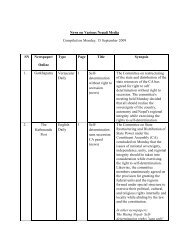

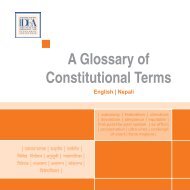
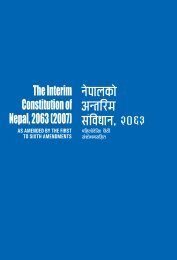
![g]k fnsf blntx? / gofF ;+l jwfg](https://img.yumpu.com/49483602/1/184x260/gk-fnsf-blntx-goff-l-jwfg.jpg?quality=85)
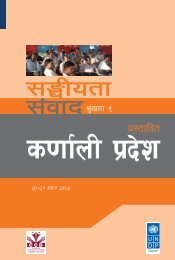
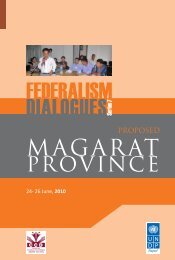
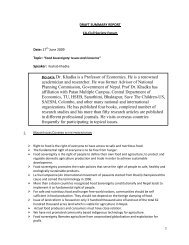
![+ljwfg;ef, /fHosf]k'g](https://img.yumpu.com/41604075/1/184x260/-ljwfgef-fhosfkg.jpg?quality=85)
